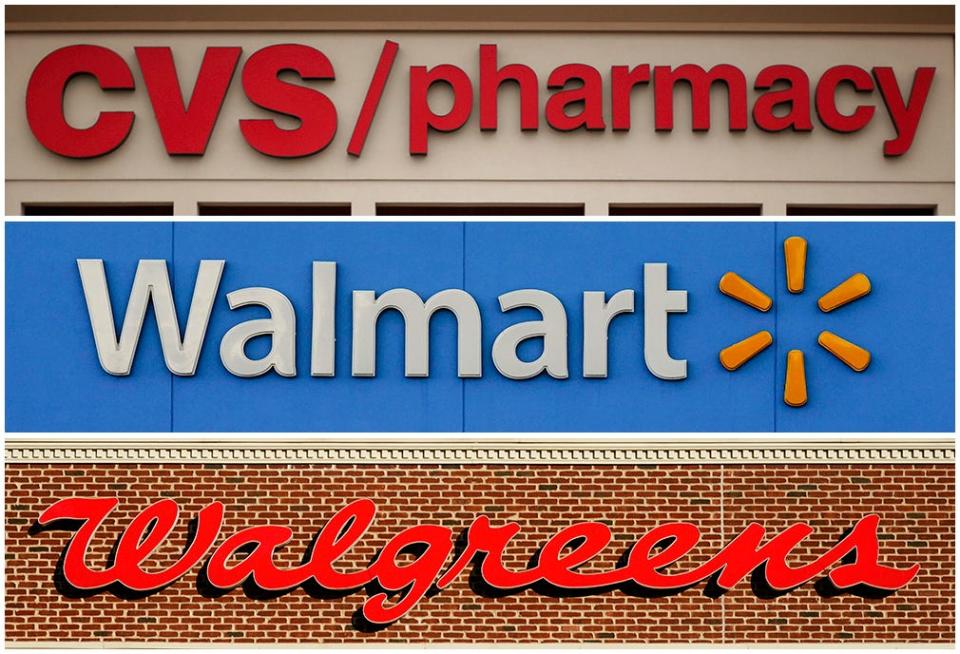A pharmacist shortage has caused Walmart, CVS and others to cut hours. Here's what to know
- Oops!Something went wrong.Please try again later.
When Brandi Strader, director of pharmacy services for HSHS St. John's Hospital, was first getting started as a pharmacist 14 years ago, she heard teachers say that there was a need for skilled workers to fill needs in the field.
But she's never seen anything like this – a shortage of pharmacists, for hospitals and retailers alike.
"In hospitals, we have never had an issue filling pharmacist positions," Strader said. "I have two open positions now and I have never had a lower number of applicants than I do today."
This shortage has caused turmoil – not just for inpatient facilities where lifesaving medicine is distributed, but for the customer who needs a prescription filled at a retail location. Many retail chains – such as CVS, Walgreens and Walmart – are responding by cutting back on operating hours.
Why is there a shortage of pharmacists?
Strader said that two factors have come into play when it comes to pharmacy shortages. First, pharmacy schools have had lower enrollment, meaning that there are fewer people with the proper qualifications to take on roles in the industry.
In addition, many experienced pharmacists have decided to retire instead of continuing to work as they get older.

"Many pharmacists work until they cannot work anymore," Strader said. "They don't really pick an age to retire, but we've seen in the last two years that shift a little bit. People that were of eligibility for retirement did go ahead and retire."
For those who don't decide to retire, many have chosen to leave the field full-time and embrace a part-time schedule in order to find a kind of work-life balance that can be difficult in the pharmaceutical industry.
"A lot of those hours are not being filled at hospitals and (retail) pharmacies," Strader said.
Even more pharmacists are planning to shift from working in retail to working at a hospital, leaving opportunities open in their former positions.
More from USA Today:CVS cuts pharmacy hours: Thousands of locations to reduce hours amid pharmacist shortage
How are pharmacy chains reacting to the shortage?
CVS announced last week that they would cut hours at two-thirds of their retail locations beginning in March. As for what it means for Springfield's nine locations, a spokesperson for the company said that market-specific information was unavailable.
Walmart also announced that they would shorten location hours with pharmacies scheduled to close at 7 p.m. on weekdays. Weekend hours would be unaffected. The company did not respond to requests for comment.
More from USA Today:Walmart joins CVS in closing pharmacies early amid staffing challenges
A spokesperson for Walgreens said that hours had been adjusted to balance staffing and resources along with the needs of their customers, but pharmacy staffing had improved over the last several months including at the nine stores in Springfield.
How are the hospitals reacting?
Strader said that hospitals like St. John's are having to move much of their pharmacy work in-house rather than rely on an outside retail pharmacy to provide medication for their patients. Prescriptions are now more likely to be filled at the in-house pharmacy than at an outside location.
"(We're) trying to take the bigger-box store out of the picture, utilizing our resources," Strader said. "We cannot, right now, depend on the Walgreens and CVS' to be open longer hours."
What's the difference between retail and hospital pharmacies?
Strader said retail and hospital pharmacies can be busy filling prescriptions, but hospital facilities work directly with nurses and healthcare providers and have a consistent, set number of patients each day.
"You could have a large number of people at the front door of a retail pharmacy," Strader said. "In inpatient, we know where our census is and we can adjust to that in the hospital."
Strader said hospital pharmacies also have a direct line of communication with the medical provider about the patient and the best usage of a prescribed medication which is another key difference from retailers.
"We round at the patient's bedside, so that (the) clinical information that we're giving the provider is right there in real-time. It's not a conversation where we have to call, then they call us back and forth like it is in the retail side," Strader said. "I think more frustration happens in the retail sector because they don't have that personal relationship with the provider like you do in an inpatient hospital."
More from USA Today:Pharmacies are cutting hours and closing stores. What it means for customers.
What to do if your pharmacy is closed and you need medication?
Strader said that people should work directly with their providers to make sure that they know whether or not their medication is the kind that requires urgent action.
"They need to communicate with their health care provider to be educated about their medication," Strader said. "Is this something that can wait until tomorrow or is this something I have to have today?"
In some cases, a patient can call their physician directly and ask if they have a supply of a needed medication.
Most importantly, Strader said it's always good to be proactive when it comes to working with doctors and health care providers, as the reduced hours show that relying on pharmacies is not the best strategy.
"We cannot depend on pharmacies to be open at this point because if somebody calls tomorrow and they don't have a backup, it's not fair to them either," Strader said. "They don't want to put patients at risk."
This article originally appeared on State Journal-Register: What CVS and Walmart's pharmacy cuts mean for you in Springfield

